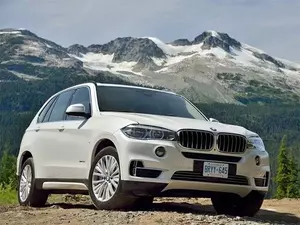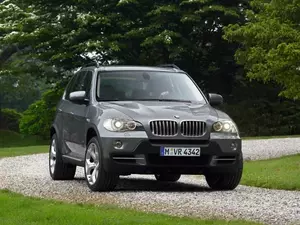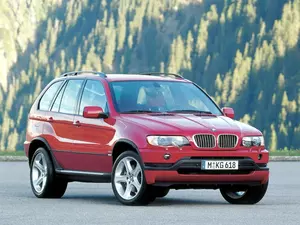


| Engine | 0—60 mph | 0—100 km/h | Top Speed | Averange Economy |
|---|---|---|---|---|
| 40d | 5.2 s | 5.5 s | 152 mph | - |
| 40i | 5.2 s | 5.5 s | 151 mph | 28 mpg |
| 50i | 4.5 s | 4.7 s | 155 mph | 20 mpg |
| 30d | 6.2 s | 6.5 s | 143 mph | 39 mpg |
| M50d | 4.9 s | 5.2 s | 155 mph | 35 mpg |
| 45e | 5.3 s | 5.6 s | 146 mph | 138 mpg |
| M50i V8 | 4.1 s | 4.3 s | 155 mph | 22 mpg |
| 25d | 7.1 s | 7.5 s | 138 mph | 41 mpg |
| Engine | 40d |
|---|---|
| 0—60 mph | 5.2 s |
| 0—100 km/h | 5.5 s |
| Top Speed | 152 mph |
| Averange Economy | - |
| Engine | 40i |
| 0—60 mph | 5.2 s |
| 0—100 km/h | 5.5 s |
| Top Speed | 151 mph |
| Averange Economy | 28 mpg |
| Engine | 50i |
| 0—60 mph | 4.5 s |
| 0—100 km/h | 4.7 s |
| Top Speed | 155 mph |
| Averange Economy | 20 mpg |
| Engine | 30d |
| 0—60 mph | 6.2 s |
| 0—100 km/h | 6.5 s |
| Top Speed | 143 mph |
| Averange Economy | 39 mpg |
| Engine | M50d |
| 0—60 mph | 4.9 s |
| 0—100 km/h | 5.2 s |
| Top Speed | 155 mph |
| Averange Economy | 35 mpg |
| Engine | 45e |
| 0—60 mph | 5.3 s |
| 0—100 km/h | 5.6 s |
| Top Speed | 146 mph |
| Averange Economy | 138 mpg |
| Engine | M50i V8 |
| 0—60 mph | 4.1 s |
| 0—100 km/h | 4.3 s |
| Top Speed | 155 mph |
| Averange Economy | 22 mpg |
| Engine | 25d |
| 0—60 mph | 7.1 s |
| 0—100 km/h | 7.5 s |
| Top Speed | 138 mph |
| Averange Economy | 41 mpg |
In 2018, BMW X5 0-60 acceleration was between 4.1 and 7.1 seconds.
BMW X5 0-60 mph was up to 57% faster in 2018 than world's average.
In 2018, BMW X5 0-60 mph to car weight ratio is shown below:
| Vehicle | Acceleration 0—60 mph (0—100 km/h) | Maximum speed | Acceleration to passenger ratio | Fuel consumption at high speed | Fuel type / gearbox |
|---|---|---|---|---|---|
| 40d | 5.2 s to 60 mph (5.5 s to 100 km/h) | 152 mph (245 km/h) | 1 s to 60 mph / person | - | Diesel / 8 Steptronic |
| 40i | 5.2 s to 60 mph (5.5 s to 100 km/h) | 151 mph (243 km/h) | 0.7 s to 60 mph / person | - | Petrol (Gasoline) / 8 Steptronic |
| 50i | 4.5 s to 60 mph (4.7 s to 100 km/h) | 155 mph (250 km/h) | 0.9 s to 60 mph / person | 26 mpg (9.2 L per 100 km) | Petrol (Gasoline) / 8 Steptronic |
| 30d | 6.2 s to 60 mph (6.5 s to 100 km/h) | 143 mph (230 km/h) | 0.9 s to 60 mph / person | 42 mpg (5.6 L per 100 km) | Diesel / 8 Steptronic |
| M50d | 4.9 s to 60 mph (5.2 s to 100 km/h) | 155 mph (250 km/h) | 0.7 s to 60 mph / person | 37 mpg (6.3 L per 100 km) | Diesel / 8 Steptronic |
| 45e | 5.3 s to 60 mph (5.6 s to 100 km/h) | 146 mph (235 km/h) | 1.1 s to 60 mph / person | - | petrol / electricity / 8 Steptronic |
| M50i V8 | 4.1 s to 60 mph (4.3 s to 100 km/h) | 155 mph (250 km/h) | 0.8 s to 60 mph / person | - | Petrol (Gasoline) / 8 Steptronic |
| 25d | 7.1 s to 60 mph (7.5 s to 100 km/h) | 138 mph (222 km/h) | 1.4 s to 60 mph / person | 44 mpg (5.4 L per 100 km) | Diesel / 8 Steptronic |
| Vehicle | 40d |
|---|---|
| Acceleration 0-60 mph (0-100 km/h) | 5.2 s to 60 mph (5.5 s to 100 km/h) |
| Maximum speed | 152 mph (245 km/h) |
| Acceleration to passenger ratio | 1 s to 60 mph / person |
| Fuel consumption at high speed | - |
| Fuel type / gearbox | Diesel / 8 Steptronic |
| Vehicle | 40i |
| Acceleration 0-60 mph (0-100 km/h) | 5.2 s to 60 mph (5.5 s to 100 km/h) |
| Maximum speed | 151 mph (243 km/h) |
| Acceleration to passenger ratio | 0.7 s to 60 mph / person |
| Fuel consumption at high speed | - |
| Fuel type / gearbox | Petrol (Gasoline) / 8 Steptronic |
| Vehicle | 50i |
| Acceleration 0-60 mph (0-100 km/h) | 4.5 s to 60 mph (4.7 s to 100 km/h) |
| Maximum speed | 155 mph (250 km/h) |
| Acceleration to passenger ratio | 0.9 s to 60 mph / person |
| Fuel consumption at high speed | 26 mpg (9.2 L per 100 km) |
| Fuel type / gearbox | Petrol (Gasoline) / 8 Steptronic |
| Vehicle | 30d |
| Acceleration 0-60 mph (0-100 km/h) | 6.2 s to 60 mph (6.5 s to 100 km/h) |
| Maximum speed | 143 mph (230 km/h) |
| Acceleration to passenger ratio | 0.9 s to 60 mph / person |
| Fuel consumption at high speed | 42 mpg (5.6 L per 100 km) |
| Fuel type / gearbox | Diesel / 8 Steptronic |
| Vehicle | M50d |
| Acceleration 0-60 mph (0-100 km/h) | 4.9 s to 60 mph (5.2 s to 100 km/h) |
| Maximum speed | 155 mph (250 km/h) |
| Acceleration to passenger ratio | 0.7 s to 60 mph / person |
| Fuel consumption at high speed | 37 mpg (6.3 L per 100 km) |
| Fuel type / gearbox | Diesel / 8 Steptronic |
| Vehicle | 45e |
| Acceleration 0-60 mph (0-100 km/h) | 5.3 s to 60 mph (5.6 s to 100 km/h) |
| Maximum speed | 146 mph (235 km/h) |
| Acceleration to passenger ratio | 1.1 s to 60 mph / person |
| Fuel consumption at high speed | - |
| Fuel type / gearbox | petrol / electricity / 8 Steptronic |
| Vehicle | M50i V8 |
| Acceleration 0-60 mph (0-100 km/h) | 4.1 s to 60 mph (4.3 s to 100 km/h) |
| Maximum speed | 155 mph (250 km/h) |
| Acceleration to passenger ratio | 0.8 s to 60 mph / person |
| Fuel consumption at high speed | - |
| Fuel type / gearbox | Petrol (Gasoline) / 8 Steptronic |
| Vehicle | 25d |
| Acceleration 0-60 mph (0-100 km/h) | 7.1 s to 60 mph (7.5 s to 100 km/h) |
| Maximum speed | 138 mph (222 km/h) |
| Acceleration to passenger ratio | 1.4 s to 60 mph / person |
| Fuel consumption at high speed | 44 mpg (5.4 L per 100 km) |
| Fuel type / gearbox | Diesel / 8 Steptronic |

| Engine | 0—60 mph | 0—100 km/h | Top Speed | Averange Economy |
|---|---|---|---|---|
| 25d | 7.3 s | 7.7 s | 137 mph | 44 mpg |
| 35i | 6.2 s | 6.5 s | 146 mph | 28 mpg |
| 50i | 4.8 s | 5 s | 155 mph | 23 mpg |
| 30d | 6.6 s | 6.9 s | 143 mph | 38 mpg |
| 40d | 5.6 s | 5.9 s | 147 mph | 38 mpg |
| M50d | 5 s | 5.3 s | 155 mph | 35 mpg |
| 40e | 6.5 s | 6.8 s | 130 mph | 71 mpg |
| Engine | 25d |
|---|---|
| 0—60 mph | 7.3 s |
| 0—100 km/h | 7.7 s |
| Top Speed | 137 mph |
| Averange Economy | 44 mpg |
| Engine | 35i |
| 0—60 mph | 6.2 s |
| 0—100 km/h | 6.5 s |
| Top Speed | 146 mph |
| Averange Economy | 28 mpg |
| Engine | 50i |
| 0—60 mph | 4.8 s |
| 0—100 km/h | 5 s |
| Top Speed | 155 mph |
| Averange Economy | 23 mpg |
| Engine | 30d |
| 0—60 mph | 6.6 s |
| 0—100 km/h | 6.9 s |
| Top Speed | 143 mph |
| Averange Economy | 38 mpg |
| Engine | 40d |
| 0—60 mph | 5.6 s |
| 0—100 km/h | 5.9 s |
| Top Speed | 147 mph |
| Averange Economy | 38 mpg |
| Engine | M50d |
| 0—60 mph | 5 s |
| 0—100 km/h | 5.3 s |
| Top Speed | 155 mph |
| Averange Economy | 35 mpg |
| Engine | 40e |
| 0—60 mph | 6.5 s |
| 0—100 km/h | 6.8 s |
| Top Speed | 130 mph |
| Averange Economy | 71 mpg |
In 2013, BMW X5 0-60 acceleration was between 4.8 and 7.3 seconds.
BMW X5 0-60 mph was up to 50% faster in 2013 than world's average.
In 2013, BMW X5 0-60 mph to car weight ratio is shown below:
| Vehicle | Acceleration 0—60 mph (0—100 km/h) | Maximum speed | Acceleration to passenger ratio | Fuel consumption at high speed | Fuel type / gearbox |
|---|---|---|---|---|---|
| 25d | 7.3 s to 60 mph (7.7 s to 100 km/h) | 137 mph (220 km/h) | 1.5 s to 60 mph / person | 48 mpg (4.9 L per 100 km) | Diesel / 8 Steptronic |
| 35i | 6.2 s to 60 mph (6.5 s to 100 km/h) | 146 mph (235 km/h) | 1.2 s to 60 mph / person | 34 mpg (6.9 L per 100 km) | Petrol (Gasoline) / 8 Steptronic |
| 50i | 4.8 s to 60 mph (5 s to 100 km/h) | 155 mph (250 km/h) | 1 s to 60 mph / person | 28 mpg (8.3 L per 100 km) | Petrol (Gasoline) / 8 Steptronic |
| 30d | 6.6 s to 60 mph (6.9 s to 100 km/h) | 143 mph (230 km/h) | 1.3 s to 60 mph / person | 41 mpg (5.7 L per 100 km) | Diesel / 8 Steptronic |
| 40d | 5.6 s to 60 mph (5.9 s to 100 km/h) | 147 mph (236 km/h) | 1.1 s to 60 mph / person | 41 mpg (5.8 L per 100 km) | Diesel / 8 Steptronic |
| M50d | 5 s to 60 mph (5.3 s to 100 km/h) | 155 mph (250 km/h) | 1 s to 60 mph / person | 38 mpg (6.2 L per 100 km) | Diesel / 8 Steptronic |
| 40e | 6.5 s to 60 mph (6.8 s to 100 km/h) | 130 mph (210 km/h) | 1.3 s to 60 mph / person | - | petrol / electricity / 8 Steptronic |
| Vehicle | 25d |
|---|---|
| Acceleration 0-60 mph (0-100 km/h) | 7.3 s to 60 mph (7.7 s to 100 km/h) |
| Maximum speed | 137 mph (220 km/h) |
| Acceleration to passenger ratio | 1.5 s to 60 mph / person |
| Fuel consumption at high speed | 48 mpg (4.9 L per 100 km) |
| Fuel type / gearbox | Diesel / 8 Steptronic |
| Vehicle | 35i |
| Acceleration 0-60 mph (0-100 km/h) | 6.2 s to 60 mph (6.5 s to 100 km/h) |
| Maximum speed | 146 mph (235 km/h) |
| Acceleration to passenger ratio | 1.2 s to 60 mph / person |
| Fuel consumption at high speed | 34 mpg (6.9 L per 100 km) |
| Fuel type / gearbox | Petrol (Gasoline) / 8 Steptronic |
| Vehicle | 50i |
| Acceleration 0-60 mph (0-100 km/h) | 4.8 s to 60 mph (5 s to 100 km/h) |
| Maximum speed | 155 mph (250 km/h) |
| Acceleration to passenger ratio | 1 s to 60 mph / person |
| Fuel consumption at high speed | 28 mpg (8.3 L per 100 km) |
| Fuel type / gearbox | Petrol (Gasoline) / 8 Steptronic |
| Vehicle | 30d |
| Acceleration 0-60 mph (0-100 km/h) | 6.6 s to 60 mph (6.9 s to 100 km/h) |
| Maximum speed | 143 mph (230 km/h) |
| Acceleration to passenger ratio | 1.3 s to 60 mph / person |
| Fuel consumption at high speed | 41 mpg (5.7 L per 100 km) |
| Fuel type / gearbox | Diesel / 8 Steptronic |
| Vehicle | 40d |
| Acceleration 0-60 mph (0-100 km/h) | 5.6 s to 60 mph (5.9 s to 100 km/h) |
| Maximum speed | 147 mph (236 km/h) |
| Acceleration to passenger ratio | 1.1 s to 60 mph / person |
| Fuel consumption at high speed | 41 mpg (5.8 L per 100 km) |
| Fuel type / gearbox | Diesel / 8 Steptronic |
| Vehicle | M50d |
| Acceleration 0-60 mph (0-100 km/h) | 5 s to 60 mph (5.3 s to 100 km/h) |
| Maximum speed | 155 mph (250 km/h) |
| Acceleration to passenger ratio | 1 s to 60 mph / person |
| Fuel consumption at high speed | 38 mpg (6.2 L per 100 km) |
| Fuel type / gearbox | Diesel / 8 Steptronic |
| Vehicle | 40e |
| Acceleration 0-60 mph (0-100 km/h) | 6.5 s to 60 mph (6.8 s to 100 km/h) |
| Maximum speed | 130 mph (210 km/h) |
| Acceleration to passenger ratio | 1.3 s to 60 mph / person |
| Fuel consumption at high speed | - |
| Fuel type / gearbox | petrol / electricity / 8 Steptronic |

| Engine | 0—60 mph | 0—100 km/h | Top Speed | Averange Economy |
|---|---|---|---|---|
| 30d | 7.2 s | 7.6 s | 130 mph | 32 mpg |
| 50i | 5.2 s | 5.5 s | 149 mph | 19 mpg |
| M50d | 5.1 s | 5.4 s | 155 mph | 31 mpg |
| 40d | 6.3 s | 6.6 s | 147 mph | 31 mpg |
| 35i | 6.5 s | 6.8 s | 146 mph | 23 mpg |
| Engine | 30d |
|---|---|
| 0—60 mph | 7.2 s |
| 0—100 km/h | 7.6 s |
| Top Speed | 130 mph |
| Averange Economy | 32 mpg |
| Engine | 50i |
| 0—60 mph | 5.2 s |
| 0—100 km/h | 5.5 s |
| Top Speed | 149 mph |
| Averange Economy | 19 mpg |
| Engine | M50d |
| 0—60 mph | 5.1 s |
| 0—100 km/h | 5.4 s |
| Top Speed | 155 mph |
| Averange Economy | 31 mpg |
| Engine | 40d |
| 0—60 mph | 6.3 s |
| 0—100 km/h | 6.6 s |
| Top Speed | 147 mph |
| Averange Economy | 31 mpg |
| Engine | 35i |
| 0—60 mph | 6.5 s |
| 0—100 km/h | 6.8 s |
| Top Speed | 146 mph |
| Averange Economy | 23 mpg |
In 2010, BMW X5 0-60 acceleration was between 5.1 and 7.2 seconds.
BMW X5 0-60 mph was up to 46% faster in 2010 than world's average.
In 2010, BMW X5 0-60 mph to car weight ratio is shown below:
| Vehicle | Acceleration 0—60 mph (0—100 km/h) | Maximum speed | Acceleration to passenger ratio | Fuel consumption at high speed | Fuel type / gearbox |
|---|---|---|---|---|---|
| 30d | 7.2 s to 60 mph (7.6 s to 100 km/h) | 130 mph (210 km/h) | 1.4 s to 60 mph / person | 35 mpg (6.7 L per 100 km) | Diesel / 8 |
| 50i | 5.2 s to 60 mph (5.5 s to 100 km/h) | 149 mph (240 km/h) | 1 s to 60 mph / person | 25 mpg (9.6 L per 100 km) | Petrol (Gasoline) / 8 |
| M50d | 5.1 s to 60 mph (5.4 s to 100 km/h) | 155 mph (250 km/h) | 1 s to 60 mph / person | 35 mpg (6.8 L per 100 km) | Diesel / 8 |
| 40d | 6.3 s to 60 mph (6.6 s to 100 km/h) | 147 mph (236 km/h) | 1.3 s to 60 mph / person | 35 mpg (6.8 L per 100 km) | Diesel / 8 |
| 35i | 6.5 s to 60 mph (6.8 s to 100 km/h) | 146 mph (235 km/h) | 1.3 s to 60 mph / person | 28 mpg (8.3 L per 100 km) | Petrol (Gasoline) / 8 |
| Vehicle | 30d |
|---|---|
| Acceleration 0-60 mph (0-100 km/h) | 7.2 s to 60 mph (7.6 s to 100 km/h) |
| Maximum speed | 130 mph (210 km/h) |
| Acceleration to passenger ratio | 1.4 s to 60 mph / person |
| Fuel consumption at high speed | 35 mpg (6.7 L per 100 km) |
| Fuel type / gearbox | Diesel / 8 |
| Vehicle | 50i |
| Acceleration 0-60 mph (0-100 km/h) | 5.2 s to 60 mph (5.5 s to 100 km/h) |
| Maximum speed | 149 mph (240 km/h) |
| Acceleration to passenger ratio | 1 s to 60 mph / person |
| Fuel consumption at high speed | 25 mpg (9.6 L per 100 km) |
| Fuel type / gearbox | Petrol (Gasoline) / 8 |
| Vehicle | M50d |
| Acceleration 0-60 mph (0-100 km/h) | 5.1 s to 60 mph (5.4 s to 100 km/h) |
| Maximum speed | 155 mph (250 km/h) |
| Acceleration to passenger ratio | 1 s to 60 mph / person |
| Fuel consumption at high speed | 35 mpg (6.8 L per 100 km) |
| Fuel type / gearbox | Diesel / 8 |
| Vehicle | 40d |
| Acceleration 0-60 mph (0-100 km/h) | 6.3 s to 60 mph (6.6 s to 100 km/h) |
| Maximum speed | 147 mph (236 km/h) |
| Acceleration to passenger ratio | 1.3 s to 60 mph / person |
| Fuel consumption at high speed | 35 mpg (6.8 L per 100 km) |
| Fuel type / gearbox | Diesel / 8 |
| Vehicle | 35i |
| Acceleration 0-60 mph (0-100 km/h) | 6.5 s to 60 mph (6.8 s to 100 km/h) |
| Maximum speed | 146 mph (235 km/h) |
| Acceleration to passenger ratio | 1.3 s to 60 mph / person |
| Fuel consumption at high speed | 28 mpg (8.3 L per 100 km) |
| Fuel type / gearbox | Petrol (Gasoline) / 8 |

| Engine | 0—60 mph | 0—100 km/h | Top Speed | Averange Economy |
|---|---|---|---|---|
| 4.8i | 6.2 s | 6.5 s | 149 mph | 20 mpg |
| 3.0 si | 7.7 s | 8.1 s | 140 mph | 23 mpg |
| 3.0 sd | 6.7 s | 7 s | 134 mph | 29 mpg |
| 3.0d | 7.7 s | 8.1 s | 134 mph | 29 mpg |
| 30d | 7.7 s | 8.1 s | 134 mph | 29 mpg |
| 30i | 7.7 s | 8.1 s | 130 mph | 23 mpg |
| 35d | 6.7 s | 7 s | 134 mph | 28 mpg |
| 48i | 6.2 s | 6.5 s | 149 mph | 20 mpg |
| Engine | 4.8i |
|---|---|
| 0—60 mph | 6.2 s |
| 0—100 km/h | 6.5 s |
| Top Speed | 149 mph |
| Averange Economy | 20 mpg |
| Engine | 3.0 si |
| 0—60 mph | 7.7 s |
| 0—100 km/h | 8.1 s |
| Top Speed | 140 mph |
| Averange Economy | 23 mpg |
| Engine | 3.0 sd |
| 0—60 mph | 6.7 s |
| 0—100 km/h | 7 s |
| Top Speed | 134 mph |
| Averange Economy | 29 mpg |
| Engine | 3.0d |
| 0—60 mph | 7.7 s |
| 0—100 km/h | 8.1 s |
| Top Speed | 134 mph |
| Averange Economy | 29 mpg |
| Engine | 30d |
| 0—60 mph | 7.7 s |
| 0—100 km/h | 8.1 s |
| Top Speed | 134 mph |
| Averange Economy | 29 mpg |
| Engine | 30i |
| 0—60 mph | 7.7 s |
| 0—100 km/h | 8.1 s |
| Top Speed | 130 mph |
| Averange Economy | 23 mpg |
| Engine | 35d |
| 0—60 mph | 6.7 s |
| 0—100 km/h | 7 s |
| Top Speed | 134 mph |
| Averange Economy | 28 mpg |
| Engine | 48i |
| 0—60 mph | 6.2 s |
| 0—100 km/h | 6.5 s |
| Top Speed | 149 mph |
| Averange Economy | 20 mpg |
In 2007, BMW X5 0-60 acceleration was between 6.2 and 7.7 seconds.
BMW X5 0-60 mph was up to 35% faster in 2007 than world's average.
In 2007, BMW X5 0-60 mph to car weight ratio is shown below:
| Vehicle | Acceleration 0—60 mph (0—100 km/h) | Maximum speed | Acceleration to passenger ratio | Fuel consumption at high speed | Fuel type / gearbox |
|---|---|---|---|---|---|
| 4.8i | 6.2 s to 60 mph (6.5 s to 100 km/h) | 149 mph (240 km/h) | 1.2 s to 60 mph / person | 26 mpg (9.2 L per 100 km) | Petrol (Gasoline) / 6 |
| 3.0 si | 7.7 s to 60 mph (8.1 s to 100 km/h) | 140 mph (225 km/h) | 1.5 s to 60 mph / person | 29 mpg (8.2 L per 100 km) | Petrol (Gasoline) / 6 |
| 3.0 sd | 6.7 s to 60 mph (7 s to 100 km/h) | 134 mph (216 km/h) | 1.3 s to 60 mph / person | 34 mpg (7 L per 100 km) | Diesel / 6 |
| 3.0d | 7.7 s to 60 mph (8.1 s to 100 km/h) | 134 mph (216 km/h) | 1.5 s to 60 mph / person | 34 mpg (6.9 L per 100 km) | Diesel / 6 |
| 30d | 7.7 s to 60 mph (8.1 s to 100 km/h) | 134 mph (216 km/h) | 1.5 s to 60 mph / person | 34 mpg (7 L per 100 km) | Diesel / 6 |
| 30i | 7.7 s to 60 mph (8.1 s to 100 km/h) | 130 mph (210 km/h) | 1.5 s to 60 mph / person | 29 mpg (8.2 L per 100 km) | Petrol (Gasoline) / 6 |
| 35d | 6.7 s to 60 mph (7 s to 100 km/h) | 134 mph (216 km/h) | 1.3 s to 60 mph / person | 33 mpg (7.1 L per 100 km) | Diesel / 6 |
| 48i | 6.2 s to 60 mph (6.5 s to 100 km/h) | 149 mph (240 km/h) | 1.2 s to 60 mph / person | 26 mpg (9.2 L per 100 km) | Petrol (Gasoline) / 6 |
| Vehicle | 4.8i |
|---|---|
| Acceleration 0-60 mph (0-100 km/h) | 6.2 s to 60 mph (6.5 s to 100 km/h) |
| Maximum speed | 149 mph (240 km/h) |
| Acceleration to passenger ratio | 1.2 s to 60 mph / person |
| Fuel consumption at high speed | 26 mpg (9.2 L per 100 km) |
| Fuel type / gearbox | Petrol (Gasoline) / 6 |
| Vehicle | 3.0 si |
| Acceleration 0-60 mph (0-100 km/h) | 7.7 s to 60 mph (8.1 s to 100 km/h) |
| Maximum speed | 140 mph (225 km/h) |
| Acceleration to passenger ratio | 1.5 s to 60 mph / person |
| Fuel consumption at high speed | 29 mpg (8.2 L per 100 km) |
| Fuel type / gearbox | Petrol (Gasoline) / 6 |
| Vehicle | 3.0 sd |
| Acceleration 0-60 mph (0-100 km/h) | 6.7 s to 60 mph (7 s to 100 km/h) |
| Maximum speed | 134 mph (216 km/h) |
| Acceleration to passenger ratio | 1.3 s to 60 mph / person |
| Fuel consumption at high speed | 34 mpg (7 L per 100 km) |
| Fuel type / gearbox | Diesel / 6 |
| Vehicle | 3.0d |
| Acceleration 0-60 mph (0-100 km/h) | 7.7 s to 60 mph (8.1 s to 100 km/h) |
| Maximum speed | 134 mph (216 km/h) |
| Acceleration to passenger ratio | 1.5 s to 60 mph / person |
| Fuel consumption at high speed | 34 mpg (6.9 L per 100 km) |
| Fuel type / gearbox | Diesel / 6 |
| Vehicle | 30d |
| Acceleration 0-60 mph (0-100 km/h) | 7.7 s to 60 mph (8.1 s to 100 km/h) |
| Maximum speed | 134 mph (216 km/h) |
| Acceleration to passenger ratio | 1.5 s to 60 mph / person |
| Fuel consumption at high speed | 34 mpg (7 L per 100 km) |
| Fuel type / gearbox | Diesel / 6 |
| Vehicle | 30i |
| Acceleration 0-60 mph (0-100 km/h) | 7.7 s to 60 mph (8.1 s to 100 km/h) |
| Maximum speed | 130 mph (210 km/h) |
| Acceleration to passenger ratio | 1.5 s to 60 mph / person |
| Fuel consumption at high speed | 29 mpg (8.2 L per 100 km) |
| Fuel type / gearbox | Petrol (Gasoline) / 6 |
| Vehicle | 35d |
| Acceleration 0-60 mph (0-100 km/h) | 6.7 s to 60 mph (7 s to 100 km/h) |
| Maximum speed | 134 mph (216 km/h) |
| Acceleration to passenger ratio | 1.3 s to 60 mph / person |
| Fuel consumption at high speed | 33 mpg (7.1 L per 100 km) |
| Fuel type / gearbox | Diesel / 6 |
| Vehicle | 48i |
| Acceleration 0-60 mph (0-100 km/h) | 6.2 s to 60 mph (6.5 s to 100 km/h) |
| Maximum speed | 149 mph (240 km/h) |
| Acceleration to passenger ratio | 1.2 s to 60 mph / person |
| Fuel consumption at high speed | 26 mpg (9.2 L per 100 km) |
| Fuel type / gearbox | Petrol (Gasoline) / 6 |

| Engine | 0—60 mph | 0—100 km/h | Top Speed | Averange Economy |
|---|---|---|---|---|
| 4.8is | 5.8 s | 6.1 s | 153 mph | 17 mpg |
| 4.4i | 6.7 s | 7 s | 130 mph | 18 mpg |
| 3.0d | 7.9 s | 8.3 s | 130 mph | 25 mpg |
| 3.0i | 8.4 s | 8.8 s | 130 mph | - |
| Engine | 4.8is |
|---|---|
| 0—60 mph | 5.8 s |
| 0—100 km/h | 6.1 s |
| Top Speed | 153 mph |
| Averange Economy | 17 mpg |
| Engine | 4.4i |
| 0—60 mph | 6.7 s |
| 0—100 km/h | 7 s |
| Top Speed | 130 mph |
| Averange Economy | 18 mpg |
| Engine | 3.0d |
| 0—60 mph | 7.9 s |
| 0—100 km/h | 8.3 s |
| Top Speed | 130 mph |
| Averange Economy | 25 mpg |
| Engine | 3.0i |
| 0—60 mph | 8.4 s |
| 0—100 km/h | 8.8 s |
| Top Speed | 130 mph |
| Averange Economy | - |
In 2003, BMW X5 0-60 acceleration was between 5.8 and 8.4 seconds.
BMW X5 0-60 mph was up to 39% faster in 2003 than world's average.
In 2003, BMW X5 0-60 mph to car weight ratio is shown below:
| Vehicle | Acceleration 0—60 mph (0—100 km/h) | Maximum speed | Acceleration to passenger ratio | Fuel consumption at high speed | Fuel type / gearbox |
|---|---|---|---|---|---|
| 4.8is | 5.8 s to 60 mph (6.1 s to 100 km/h) | 153 mph (246 km/h) | 1.2 s to 60 mph / person | 22 mpg (10.5 L per 100 km) | Petrol (Gasoline) / 6 |
| 4.4i | 6.7 s to 60 mph (7 s to 100 km/h) | 130 mph (210 km/h) | 1.3 s to 60 mph / person | 23 mpg (10.2 L per 100 km) | Petrol (Gasoline) / 6 |
| 3.0d | 7.9 s to 60 mph (8.3 s to 100 km/h) | 130 mph (210 km/h) | 1.6 s to 60 mph / person | 29 mpg (8 L per 100 km) | Diesel / 6 |
| 3.0i | 8.4 s to 60 mph (8.8 s to 100 km/h) | 130 mph (210 km/h) | 1.7 s to 60 mph / person | 24 mpg (9.9 L per 100 km) | Petrol (Gasoline) / 6 |
| Vehicle | 4.8is |
|---|---|
| Acceleration 0-60 mph (0-100 km/h) | 5.8 s to 60 mph (6.1 s to 100 km/h) |
| Maximum speed | 153 mph (246 km/h) |
| Acceleration to passenger ratio | 1.2 s to 60 mph / person |
| Fuel consumption at high speed | 22 mpg (10.5 L per 100 km) |
| Fuel type / gearbox | Petrol (Gasoline) / 6 |
| Vehicle | 4.4i |
| Acceleration 0-60 mph (0-100 km/h) | 6.7 s to 60 mph (7 s to 100 km/h) |
| Maximum speed | 130 mph (210 km/h) |
| Acceleration to passenger ratio | 1.3 s to 60 mph / person |
| Fuel consumption at high speed | 23 mpg (10.2 L per 100 km) |
| Fuel type / gearbox | Petrol (Gasoline) / 6 |
| Vehicle | 3.0d |
| Acceleration 0-60 mph (0-100 km/h) | 7.9 s to 60 mph (8.3 s to 100 km/h) |
| Maximum speed | 130 mph (210 km/h) |
| Acceleration to passenger ratio | 1.6 s to 60 mph / person |
| Fuel consumption at high speed | 29 mpg (8 L per 100 km) |
| Fuel type / gearbox | Diesel / 6 |
| Vehicle | 3.0i |
| Acceleration 0-60 mph (0-100 km/h) | 8.4 s to 60 mph (8.8 s to 100 km/h) |
| Maximum speed | 130 mph (210 km/h) |
| Acceleration to passenger ratio | 1.7 s to 60 mph / person |
| Fuel consumption at high speed | 24 mpg (9.9 L per 100 km) |
| Fuel type / gearbox | Petrol (Gasoline) / 6 |

| Engine | 0—60 mph | 0—100 km/h | Top Speed | Averange Economy |
|---|---|---|---|---|
| 3.0d | 9.6 s | 10.1 s | 124 mph | 24 mpg |
| 3.0i | 7.9 s | 8.3 s | 134 mph | 19 mpg |
| 4.6is | 6.2 s | 6.5 s | 149 mph | 16 mpg |
| 4.4i | 7.1 s | 7.5 s | 130 mph | 17 mpg |
| Engine | 3.0d |
|---|---|
| 0—60 mph | 9.6 s |
| 0—100 km/h | 10.1 s |
| Top Speed | 124 mph |
| Averange Economy | 24 mpg |
| Engine | 3.0i |
| 0—60 mph | 7.9 s |
| 0—100 km/h | 8.3 s |
| Top Speed | 134 mph |
| Averange Economy | 19 mpg |
| Engine | 4.6is |
| 0—60 mph | 6.2 s |
| 0—100 km/h | 6.5 s |
| Top Speed | 149 mph |
| Averange Economy | 16 mpg |
| Engine | 4.4i |
| 0—60 mph | 7.1 s |
| 0—100 km/h | 7.5 s |
| Top Speed | 130 mph |
| Averange Economy | 17 mpg |
In 2000, BMW X5 0-60 acceleration was between 6.2 and 9.6 seconds.
BMW X5 0-60 mph was up to 1% slower in 2000 than world's average.
In 2000, BMW X5 0-60 mph to car weight ratio is shown below:
| Vehicle | Acceleration 0—60 mph (0—100 km/h) | Maximum speed | Acceleration to passenger ratio | Fuel consumption at high speed | Fuel type / gearbox |
|---|---|---|---|---|---|
| 3.0d | 9.6 s to 60 mph (10.1 s to 100 km/h) | 124 mph (200 km/h) | 1.9 s to 60 mph / person | 33 mpg (7.1 L per 100 km) | Diesel |
| 3.0i | 7.9 s to 60 mph (8.3 s to 100 km/h) | 134 mph (215 km/h) | 1.6 s to 60 mph / person | 24 mpg (9.7 L per 100 km) | Petrol (Gasoline) |
| 4.6is | 6.2 s to 60 mph (6.5 s to 100 km/h) | 149 mph (240 km/h) | 1.2 s to 60 mph / person | 21 mpg (11.4 L per 100 km) | Petrol (Gasoline) / 5 |
| 4.4i | 7.1 s to 60 mph (7.5 s to 100 km/h) | 130 mph (210 km/h) | 1.4 s to 60 mph / person | 21 mpg (11.1 L per 100 km) | Petrol (Gasoline) / 5 |
| Vehicle | 3.0d |
|---|---|
| Acceleration 0-60 mph (0-100 km/h) | 9.6 s to 60 mph (10.1 s to 100 km/h) |
| Maximum speed | 124 mph (200 km/h) |
| Acceleration to passenger ratio | 1.9 s to 60 mph / person |
| Fuel consumption at high speed | 33 mpg (7.1 L per 100 km) |
| Fuel type / gearbox | Diesel |
| Vehicle | 3.0i |
| Acceleration 0-60 mph (0-100 km/h) | 7.9 s to 60 mph (8.3 s to 100 km/h) |
| Maximum speed | 134 mph (215 km/h) |
| Acceleration to passenger ratio | 1.6 s to 60 mph / person |
| Fuel consumption at high speed | 24 mpg (9.7 L per 100 km) |
| Fuel type / gearbox | Petrol (Gasoline) |
| Vehicle | 4.6is |
| Acceleration 0-60 mph (0-100 km/h) | 6.2 s to 60 mph (6.5 s to 100 km/h) |
| Maximum speed | 149 mph (240 km/h) |
| Acceleration to passenger ratio | 1.2 s to 60 mph / person |
| Fuel consumption at high speed | 21 mpg (11.4 L per 100 km) |
| Fuel type / gearbox | Petrol (Gasoline) / 5 |
| Vehicle | 4.4i |
| Acceleration 0-60 mph (0-100 km/h) | 7.1 s to 60 mph (7.5 s to 100 km/h) |
| Maximum speed | 130 mph (210 km/h) |
| Acceleration to passenger ratio | 1.4 s to 60 mph / person |
| Fuel consumption at high speed | 21 mpg (11.1 L per 100 km) |
| Fuel type / gearbox | Petrol (Gasoline) / 5 |